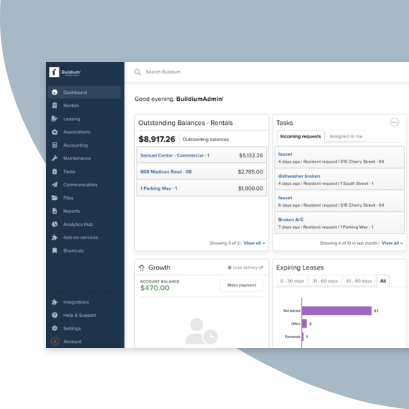In real estate management, finding the right software to support how you operate can make a difference for your business every day. Small improvements that a particular tool or feature provides can add up to hours of time saved and even six-figure improvements on your bottom line.
With so many options available, choosing the right platform matters.
This guide covers the top property management software options, key features to look for, and how each platform stacks up in terms of capabilities, price, and overall value.
What Is Rental Real Estate Management Software?
Rental real estate management software is designed to help property managers handle various aspects of managing properties, from rent collection and tenant communications to maintenance and financial reporting. These platforms consolidate critical tasks into one system, enabling property managers to work more efficiently and accurately.
Rental management software often includes cloud-based systems that allow users to access property data anywhere. Whether you manage residential, commercial, or mixed-use properties, this software simplifies operations, allowing you to focus on growing your business.
What Are the Benefits of Rental Real Estate Management Software?
Implementing real estate management software can help you manage properties more effectively. Here are the key benefits:
- Save Time: Automating tasks such as rent collection, lease tracking, and financial reporting saves time and reduces the need for manual work.
- Improve Financial Management: With built-in accounting tools, you can track rent payments, manage expenses, and create reports automatically. This leads to greater financial clarity and less room for error.
- Enhance Communication: These platforms allow you to easily communicate with tenants and vendors. Send reminders, resolve issues, and track conversations, all in one place.
- Make Data-Driven Decisions: Software with reporting and analytics helps you track key performance metrics such as occupancy rates, rent collection, and expenses. This data empowers you to make informed decisions for your business.
- Maintain Compliance: Property management software helps you stay up to date with local laws and regulations. Automated reminders and documentation keep you organized and reduce the risk of missing important compliance tasks.
Software makes day-to-day management more efficient and helps you stay on top of all the important aspects of your business.
Must-Have Features of the Best Rental Real Estate Management Software
When evaluating rental real estate management software, look for features that will benefit you and your portfolio. Here are the top features to look for:
Advanced Accounting Capabilities
Real estate management requires precise accounting, and the best software platforms include comprehensive accounting features such as:
- Automated rent collection and tracking
- Financial reporting tools, such as income statements and balance sheets
- Bank account reconciliation
- Expense management and budgeting tools
These features keep accurate financial records and simplify audit preparation. Some platforms include specific tax prep features for faster 1099 processing.
Key benefit: Automated tools reduce manual errors and provide real-time insights into your property’s financial health.
A Lead-to-Lease Toolkit
The leasing process can be time-consuming. With a comprehensive lead-to-lease toolkit, you can:
- Capture and track leads more efficiently
- Automate tenant screenings and applications
- Generate and sign leases electronically
- Process deposits and initial rent payments online
This set of tools reduces the time spent on administrative tasks and helps you fill vacancies quickly, minimizing downtime between tenants and ultimately bringing in mroe revenue, more consistently.
Maintenance and Vendor Management Tools
Handling maintenance issues quickly and efficiently is a core part of property management. The best software offers tools for:
- Receiving and managing maintenance requests
- Generating work orders for service technicians or vendors
- Tracking maintenance progress and completion
- Managing vendor relationships and contracts
By centralizing maintenance management, you can respond faster to tenant requests and keep your properties in good condition, all while maintaining strong vendor relationships.
For even more support, look for software with dedicated, third-party maintenance services such as a Maintenance Contact Center that can take tenant requests and field work orders 24/7/365, while giving you full visibility and control when you need it.
Communication Portals
Clear communication defines your property management reputation and how well you operate day to day. An effective software platform includes communication portals to help you:
- Send reminders about rent payments, maintenance updates, and lease renewals
- Track all communication with tenants, vendors, and other stakeholders
- Address issues and requests promptly
These portals should be available for both renters and owners, giving both groups the ability to find the information you need without needing to contact your team. When set up right, they improve the transparency and speed of interactions, lead to lower turnover, and longer-lasting relationships.
Business Analytics and Reporting Dashboards
With detailed analytics, you can track the performance of your properties and operations. Key features include:
- Occupancy rate tracking
- Rent collection performance
- Operational costs and profit margins
This data can help you easily identify trends, address underperforming areas, and make adjustments to improve your company’s profitability.
An Open API and Customization
Flexibility is important when it comes to real estate management. Look for software that offers:
- An open API to integrate with other systems
- Customization options for workflows and reports
This allows you to tailor the software to fit your specific needs, whether you manage a small portfolio or a large mixed-use property.
Integrations with Other Software
For greater efficiency, your property management software should integrate with other tools you use, such as:
- Accounting platforms such as QuickBooks or Xero
- CRM systems for managing tenant relations
- Payment processors like Stripe or PayPal
These integrations save time and improve the accuracy of data across platforms, eliminating the need for manual data entry.
How to Choose the Right Property Management Software for Your Business
To choose the right software, you need to:
- Match features to your needs: Align capabilities with your portfolio requirements
- Consider your budget: Compare costs based on value, not just price
- Test your options: Use trials and demos before committing
Assess Your Property Management Portfolio
Different software platforms suit different property types. Larger portfolios benefit from comprehensive, scalable features. Smaller operations need user-friendly platforms that won’t feel overwhelming.
Portfolio size guide:
- 1-50 units: Smaller portfolios typically benefit from software that emphasizes ease of use and core features
- 50-200 units: Mid-sized portfolios generally need automation and stronger reporting to scale efficiently
- 200+ units: Larger portfolios typically prioritize scalability, advanced analytics, and extensibility (e.g., via an open API)
Consider Your Budget
Pricing varies between platforms. Some options are more affordable and cover the basics, while others require a larger investment for more comprehensive tools. The most important thing is to compare costs based on the value each platform offers your business.
Read User Reviews and Use Free Trials
Before committing, read user reviews to understand the experiences of other property managers. Reviews often point out practical strengths and weaknesses that are not always obvious from a company’s website. Many software providers also offer free trials. Use them to test a platform’s features and see if it aligns with your needs. Make sure to include your team when testing each option to get their feedback.
1. Buildium
Comprehensive Property Management Software
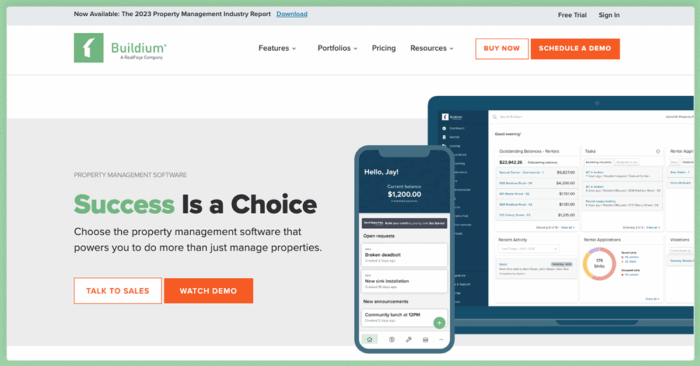
Buildium® is a popular choice for property managers seeking a comprehensive platform. It’s ideal for businesses of all sizes—whether you manage single-family rentals, multifamily units, or associations. Its Marketplace of dozens of fully integrated partners makes it even more adaptable to your specific needs.
Features
Buildium’s core features are extensive and cover every major area of property management, including:
- Online marketing through a free website and listing syndication, online applications, tenant screening, and online lease management, including signing and document management.
- Maintenance ticketing, tracking, inspections, and communication through the resident portal and the property management dashboard.
- Automated electronic payments and accounting, as well as 1099 eFIling.
- Business performance metrics via a suite of reporting tools, as well as analytics & insights capabilities for easy report generation and sharing with clients.
- A full suite of lead-to-lease tools that takes your prospective tenants from application to tenant screening to signed lease.
- A mobile app that allows you, your tenants, and your owners to text, pay, and work on the go.
Buildium also has an open API for even greater flexibility. It makes it possible to create customized data workflows and automations to get the greatest possible efficiency and ROI gains as you scale operations or tackle a specific pain point.
Pricing
Buildium offers three pricing tiers. Each includes these features:
- Accounting
- Maintenance
- Tasks
- Violations
- Online Portals
- Resident & Board Member Communications
The three tiers are customized to meet the needs of residential property management businesses in different phases of growth:
Essential: Starting at $62/month (current site pricing), with a free marketing website, tenant screening options, and standard reporting.
Growth: Starting at $192/month (current site pricing), adds Unlimited eSignatures, lower ePay transaction fees, live phone support, and analytics/insights.
Premium: Starting at $400/month (current site pricing) and includes everything in Growth, plus up to $500 in free leads (with eligibility), Open API, Priority Support, and a dedicated growth consultant.
2. Propertyware
Customizable Software for Rental Real Estate Management
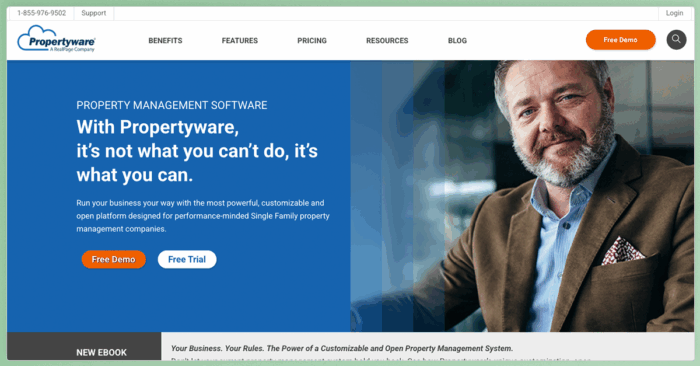
If you need a solution that adapts to your business, Propertyware® offers a range of customization options to meet your specific needs.
Features
Propertyware features custom fields, dashboards, and reports. Setting up these customizations requires time and experience, but they prove highly beneficial for experienced property management companies with unique requirements.
Its open API lets property management firms integrate other property management apps or develop their own to connect with the Propertyware dashboard.
This is all on top of core property management functions such as accounting, maintenance, lead-to-lease, multi-location oversight, vendor credentials, utility and bill oversight, and owner and resident insurance.
These capabilities suit larger property managers or management companies seeking a high degree of customization. Smaller property managers, or those preferring flexible software with integration options and straightforward usability, may consider Buildium a better choice for their operations.
Pricing
Propertyware has three pricing tiers:
- Basic starts at $1 per unit per month, with a $250 minimum
- Plus starts at $1.50 per unit per month, with a $350 minimum
- Premium starts at $2 per unit per month, with a $450 minimum
3. ManageCasa
Single-Family Real Estate with Easy Add-Ons
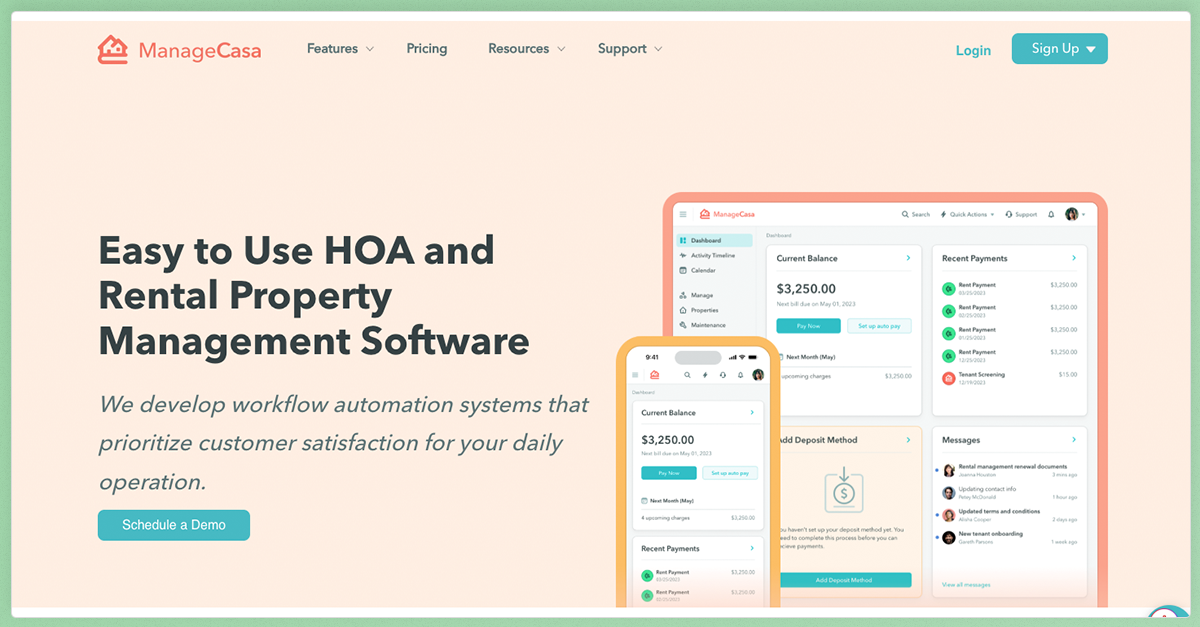
ManageCasa® provides an intuitive platform, especially for managing single-family homes. It’s a solid choice for landlords and small property managers looking for a simple platform. While it offers some useful add-ons that extend the platform’s capabilities, it might not be well-suited for property managers that want a more extensive or customizable set of features.
Features
ManageCasa’s main set of features include an owner portal, custom fields, and ACH and credit/debit card payments. It also includes standard listing marketing, work order management, and leasing management features. While limited in its scope, this toolkit is user-friendly and the platform can be easy to learn.
Pricing
ManageCasa pricing varies by portfolio type. However, residential portfolios have two pricing tiers: The Base Plan for $1.25/unit/month and the Premium Plan for $2.50/unit/month.
4. MRI Living
Established Software for Multifamily Real Estate
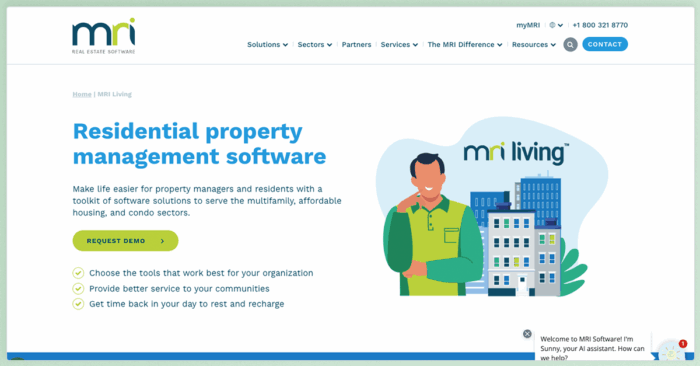
MRI Living® is ideal for larger, multifamily property management companies. The product’s parent company, MRI, is an established name in the industry and has been around since 1971.
Features
MRI Living organizes its platform around data-focused tools. The company divides the software’s capabilities into several main sections. The lead-to-lease feature helps property teams handle rental activities, from marketing and tours to applications, contracts, and renewals.
General property management features support daily operations and gather important data in one dashboard. Property managers track performance indicators such as turnover rates, occupancy figures, and renewal numbers.
MRI Living’s affordable housing tools keep your portfolio current with regulations and assets, while condo and HOA management capabilities let teams automate financial allocations, organize various payment methods for homeowners, and supervise condo development and sales.
Pricing
MRI does not publish their pricing details directly on their site. For an accurate quote, you’ll need to contact their team directly.
5. TenantCloud
Landlord-Focused Rental Real Estate Management Software
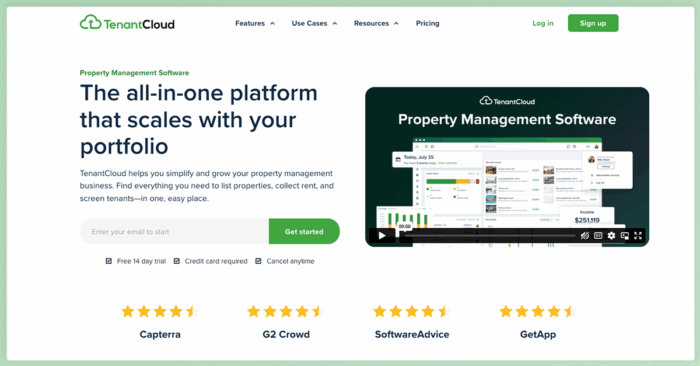
While TenantCloud® can handle larger portfolios, its more focused on tools that have a do-it-yourself approach making it better suited for landlords.
Features
TenantCloud includes standard features found in rental property management software, such as accounting, reporting, online applications and screening, online rent payments, and maintenance tracking.
You’’ll also find some distinct options within TenantCloud:
- Roommates: The roommate feature lets you screen, approve, and set up leases for each roommate. After move-in, you can collect payments from each roommate for their portion of the rent.
- Rentability Report: Landlords compare listings similar to their own and review rent trends in the area to determine how much to charge and stay competitive.
- Maintenance Bidding: Landlords submit maintenance requests through TenantCloud and receive bids for each job.
Pricing
TenantCloud offers Starter, Growth, Pro, and Business tiers. As of current pricing, Starter is $18/month (or $16.50 with annual billing) and includes core tools (online payments, maintenance, listings/applications); lead tracking is available, while some advanced features appear in higher tiers.
Growth: $35/month (or $32.10 with annual billing) and adds reporting, inspections, and a property message board; the separate Owner Portal appears in Pro.
Pro: $60/month (or $55 with annual billing), adding tax reports, bank reconciliation, and a separate Owner Portal; integration availability should be confirmed in the current feature matrix.
Business: Custom pricing; adds team and task management and UI customization. Confirm listing auto-refresh availability in the current plan matrix.
Starter, Growth, and Pro plans allow users to send 10, 15, and 20 lead text responses monthly, respectively. Those choosing the Business plan set their own message volume at “”volume pricing.””
TenantCloud provides support resources and a support phone line; confirm plan-specific entitlements with TenantCloud as these may change.
6. Rentec Direct
Rental Real Estate Management Software that Covers the Basics Well
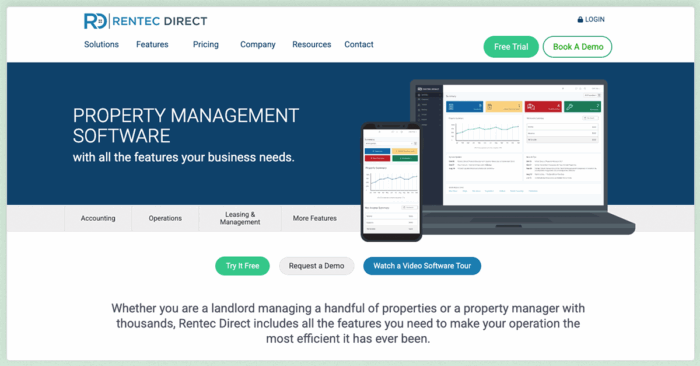
Rentec Direct® is an economical platform that offers a handful of basic, but important core property management features. For those looking for a budget-friendly option with reliable functionality, Rentec Direct can be a viable choice.
Features
Rentec Direct’s features organize into three main groups: Accounting, Operations, and Leasing & Management. While the platform includes marketing, listing, and tenant communication tools, its core strengths fall within these categories.
Accounting covers general bookkeeping, trust accounting, reporting, and online rent payments, which tenants submit through their dedicated portal.
Operations feature maintenance reporting via the tenant portal, insurance management, credit reporting, and access to an owner portal.
The platform also includes basic leasing tools such as tenant screening and lead tracking.
Pricing
Rentec Direct features two pricing plans: Rentec Pro, designed for landlords and investors, and Rentec PM, designed for property managers. Both plans calculate monthly rates based on the number of units you manage.
After you enter your unit count on the pricing page, the site displays your monthly cost. Rentec Pro currently starts at $55/month on the pricing page, with an annual billing discount; exact monthly amounts vary by unit count.
Prices increase with higher unit counts
Which Option Is the Best Rental Real Estate Software for Your Rental Properties?
To choose the best software for your needs, you’ll need to match features up with your own portfolio and operational needs, make sure that you’re budgeting properly, and then get familiar with your top contenders. Here’s what to consider.
Assess Your Property Management Portfolio
Different software platforms are better suited to different types of properties. If you manage a variety of properties or a larger portfolio, platforms such as Buildium or MRI Living offer comprehensive, scalable features. Buildium has the added benefit of combining ease-of-use with customization, so you’ll get the support you need without getting overwhelmed, regardless of your size.
Budget Considerations
Pricing varies significantly between platforms. If you’re on a budget, consider Rentec Direct or TenantCloud, which offer affordable options with the basics. For more advanced features, Buildium and Propertyware might require a larger investment but offer more comprehensive solutions. The most important consideration here is to appoach cost comparisons based on value.
Take a Deeper Dive with our Property Management Software Pricing Guide
User Reviews and Free Trials
Before committing to any platform, take the time to read user reviews and testimonials to understand the experiences of other property managers and renters. Reviews often highlight practical strengths and weaknesses, unexpected challenges, and standout features that aren’t always obvious from promotional materials.
Take a Deeper Dive with our Guide to Property Management Software Reviews
Many software providers offer free trials, so take advantage of this to test the platform’s features and determine if it aligns with your needs. Buildium, for example offers two main ways to test out its capabilities; a 14-day, free trial and live, guided demo. Both options are risk free and don’t require a credit card.
Be sure to loop in members of your team when testing each option, so you can get their feedback. Be wary of any platform that doesn’t let you test the product before committing.
Ready to Start Your Search for the Best Rental Real Estate Software?
Choosing the right rental real estate management software is a major decision, chalk full of factors you’ll need to consider, but the sections in this guide can add some structure to your search.
When making your decision, remember to keep the considerations below in mind.
Key Takeaways:
- Compare software features with the needs of your property portfolio to identify the right fit. Some core features to look for include: accounting, maintenance, leasing, communication, analytics, customization, and integrations.
- Calculate costs based on value and select tools within your budget that match your operational requirements.
- Read user reviews and explore testimonials to understand how each platform performs in real management scenarios.
- Test available platforms using free trials or guided demos to gather hands-on feedback from your team.
- Evaluate platforms such as Buildium for comprehensive functionality or Propertyware for high customization, depending on your portfolio size and business goals.
- Choose software that supports accounting, maintenance management, and effective tenant communication to strengthen your rental operations.
If you want to dive in and take a hands-on approach to evaluating software, consider Buildium’s demo or free trial and remember: finding the right fit means choosing a platform that’s flexible enough to grow with your business, in whatever direction you take it.
Frequently Asked Questions
What features should I look for in the best rental real estate management software?
Prioritize robust accounting, online payments, maintenance tracking, and tenant communication tools. Look for an intuitive interface with reliable customer support and scalability options.
How does rental real estate management software improve my property management processes?
The software automates rent collection, tenant screening, and maintenance requests while centralizing all data. This reduces manual errors, saves time, and improves decision-making through real-time insights.
Is there a difference between free and paid rental real estate management software?
Yes, there is a difference between free and paid rental real estate management software. Free versions often offer basic features with limitations on the number of listings or users and may include ads, while paid versions typically provide comprehensive tools, advanced features like automation and analytics, customer support, and greater scalability, catering to larger property portfolios and more complex management needs. Additionally, paid software usually receives more frequent updates and enhancements.
Can rental real estate management software integrate with other tools and platforms I use?
Yes, most rental real estate management software can integrate with a variety of other tools and platforms to streamline operations. These integrations often include accounting software like QuickBooks, marketing platforms, CRM systems, and even smart home technology, allowing for seamless management and automation of numerous functions related to property management. This interoperability helps enhance productivity by reducing manual data entry and ensuring all systems are up to date.
What kind of customer support is typically offered with rental real estate management software?
Many providers offer knowledge bases and multi-channel support; 24/7 support is available with some providers but is not universal.
